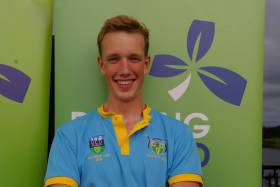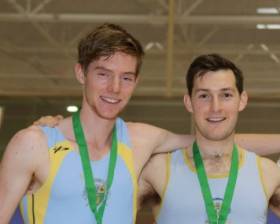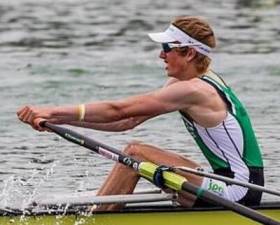Displaying items by tag: Mulvaney
Ireland Under-23 Crews Contest A Finals at World Rowing
#Rowing: David O'Malley and Shane Mulvaney finished fourth in their A Final of the under-23 lightweight pair at the World Rowing Championships in Rotterdam. Greece looked like they might dominate the race completely, but Switzerland took over and relegated them to the silver medal. Turkey took bronze - with Ireland finishing well, despite having placed well back in the early stages.
The Ireland under-23 quadruple finished fifth in their A Final. Britain won well, taking on and beating Germany and Italy, who took the silver and bronze. As the field tightened up at the finish, Canada were fourth and Ireland won a battle with Sweden to take fifth.
World Rowing Championships, Rotterdam (Irish interest; selected results)
Men
Lightweight Pair A/B Semi-Final Two (Three to A Final; rest to B Final): 1 France 6:30.56, 2 Ireland (M O'Donovan, S O'Driscoll) 6:32.18, 3 United States 6:33.19; 4 Brazil 6:35.07, 5 Italy 6:37.34, 6 Spain 6:40.82.
Lightweight Single Sculls - A/B Semi-Final One (Three to A Final; rest to B Final): 1 Ireland (P O'Donovan) 6:51.71, 2 Slovenia 6:52.31, 3 Germany 6:52.32; 4 Spain 6:53.21, 6 Italy 7:17.33.
Under-23 Lightweight Pair - A Final: 1 Switzerland 6:26.47, 2 Greece 6:29.25, 3 Turkey 6:30.92; 4 Ireland (S Mulvaney, D O'Malley) 6:34.37, 5 China 6:44.59, 6 United States 6:52.32.
Under-23 Lightweight Quadruple - A Final: 1 Britain 5:53.15, 2 Germany 5:54.68, 3 Italy 5:54.74; 3 Canada 5:55.96, 5 Ireland (F McCarthy, S O'Connell, S O'Connor, C Hennessy) 5:57.67, 6 Sweden 5:58.19.
Under-23 Quadruple Sculls - B Final (Places 7 to 12): 1 Russia 5:54.0; 6 Ireland (D Buckley, J Casey, P Boomer, S McKeown) 6:01.78.
Brilliant Win Sends Ireland Pair Into World Rowing Final
#Rowing: Ireland’s David O’Malley and Shane Mulvaney became the country’s first A Finalists at the World Rowing Championships in Rotterdam today. The under-23 lightweight pair won their semi-final with almost three seconds to spare. The two UCD men took over from early leaders Turkey by half way and then left the rest behind. Turkey finished second and the United States ousted Canada to take the third A Final spot.
World Rowing Championships, Rotterdam (Irish interest; selected results)
Men
Under-23 Lightweight Pair - Semi-Finals (First Three to A Final; rest to B Final) - Semi-Final One: 1 Greece 6:39.18, 2 Switzerland 6:40.01, 3 China 6:44.52. Semi-Final Two: 1 Ireland (S Mulvaney, D O’Malley) 6:46.20, 2 Turkey 6:49.11, 3 United States 6:50.75.
O'Malley and Mulvaney Hit the Mark at World Rowing Championships
# Rowing: Ireland’s campaign at the World Championships in Rotterdam, which feature senior, under-23 and junior events, started well this morning. The Ireland Under-23 lightweight pair of David O’Malley and Shane Mulvaney secured a semi-final place. Greece and Turkey swapped places ahead of them, but the Ireland crew nailed down third and direct qualification. Germany struggled and could only take fourth and a repechage place. Turkey passed Greece before the line.
World Rowing Championships, Rotterdam (Selected Results; Irish interest)
Men
Under-23 Lightweight Pair - Heat Two (First Three to A/B Semi-Final; rest to Repechages): 1 Turkey 6:39.80, 2 Greece 6:40.70, 3 Ireland (S Mulvaney, D O’Malley) 6:45.09.































































